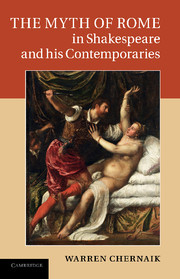Book contents
- Frontmatter
- Contents
- Acknowledgements
- Introduction: a Roman thought
- 1 Roman historians and the myth of Rome
- 2 The wronged Lucretia and the early republic
- 3 Self-inflicted wounds
- 4 ‘Like a Colossus’: Julius Caesar
- 5 Ben Jonson's Rome
- 6 O'erflowing the measure: Antony and Cleopatra
- 7 The city and the battlefield: Coriolanus
- 8 Tyranny and empire
- 9 Ancient Britons and Romans
- Postscript: Shakespeare and the republican tradition
- Notes
- Bibliography
- Index
Postscript: Shakespeare and the republican tradition
Published online by Cambridge University Press: 29 March 2011
- Frontmatter
- Contents
- Acknowledgements
- Introduction: a Roman thought
- 1 Roman historians and the myth of Rome
- 2 The wronged Lucretia and the early republic
- 3 Self-inflicted wounds
- 4 ‘Like a Colossus’: Julius Caesar
- 5 Ben Jonson's Rome
- 6 O'erflowing the measure: Antony and Cleopatra
- 7 The city and the battlefield: Coriolanus
- 8 Tyranny and empire
- 9 Ancient Britons and Romans
- Postscript: Shakespeare and the republican tradition
- Notes
- Bibliography
- Index
Summary
In considering the relationship of Shakespeare's plays to the republican tradition, two recent books argue opposite positions. Andrew Hadfield's Shakespeare and Republicanism (2005) has been acclaimed by reviewers as ‘an important and even groundbreaking book … showing how significant and prevalent republican discourses were in the Elizabethan theater’. To Hadfield, Lucrece and Titus Andronicus demonstrate ‘Shakespeare's decision to fashion himself as a republican author’. In Hadfield's reading, the republican allegiances of the early Shakespeare are straightforward. ‘The most significant aspect’ of Titus Andronicus ‘is its republicanism’, and Lucrece's resistance to Sextus Tarquinius illustrates ‘a political awakening’ on her part, the inevitable conclusion that the Romans ‘would be better off without kings ever again’. One work after another by Shakespeare and his contemporaries reveals ‘how clearly republicanism had set the political agenda in Shakespeare's England’.
A very different Shakespeare emerges from the essays in Shakespeare and Early Modern Political Thought (2009). In the editors' introduction and in essays by Conal Condren, David Colclough, and Eric Nelson, Shakespeare is presented as deeply sceptical about some of the principal tenets of republican thought or even as hostile to republicanism. As Quentin Skinner says in the Afterword, ‘for Shakespeare … the world of politics and the life of virtue appear to be largely incompatible’. According to the introduction:
It is difficult to avoid the conclusion that Shakespeare, refusing to commit clearly either to republican or monarchical government, was simply cynical about politics … What mattered was not any particular constitution but the patterns of conduct and value that should prevail.
- Type
- Chapter
- Information
- The Myth of Rome in Shakespeare and his Contemporaries , pp. 244 - 248Publisher: Cambridge University PressPrint publication year: 2011



